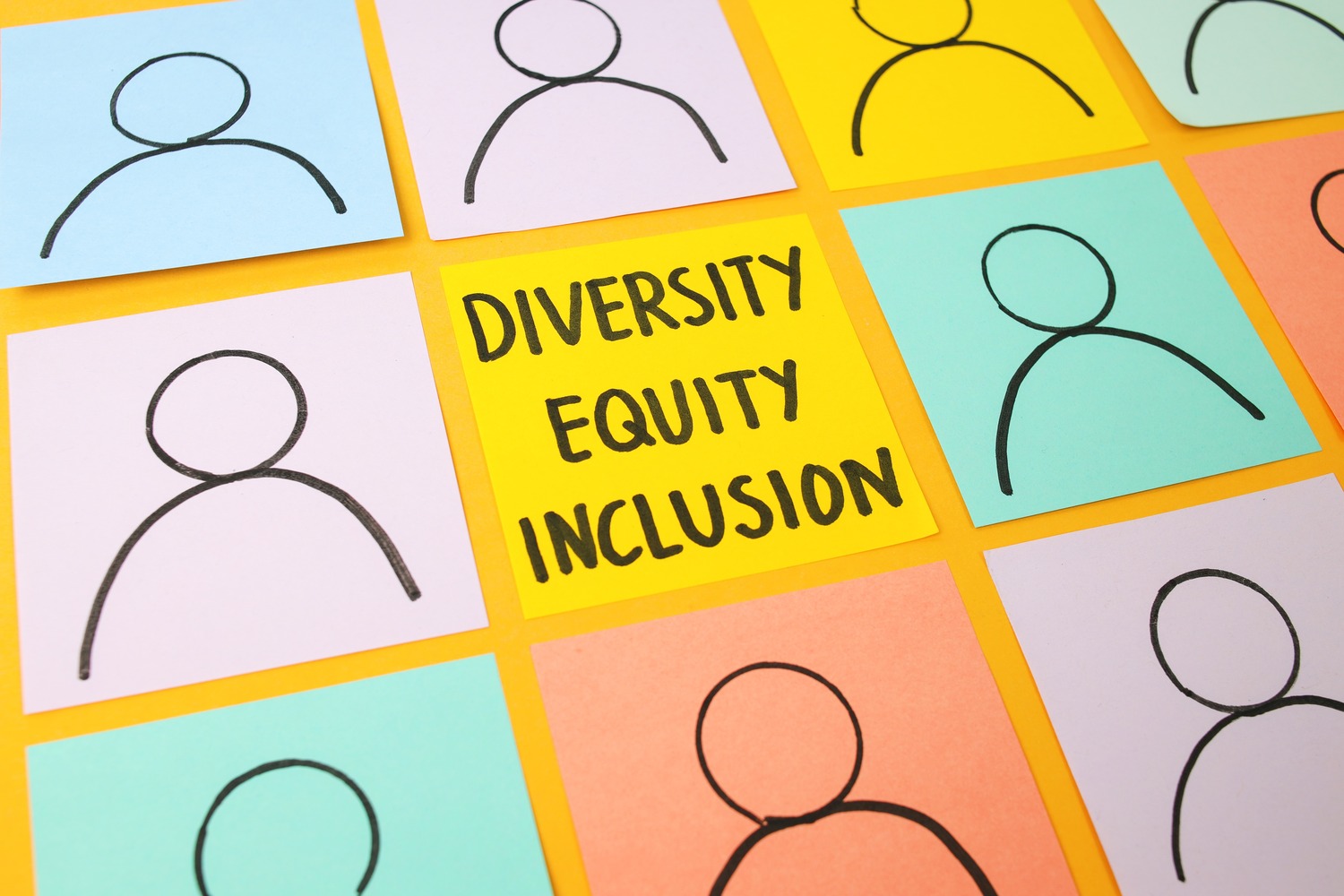As Cyprus becomes more integrated with the global market, diversity, equity, and inclusion (DEI) are moving higher on the workplace agenda. DEI ensures that people of all backgrounds feel valued, respected, and empowered—a principle that resonates strongly in a country known for its mix of cultures and traditions. Beyond social responsibility, inclusive practices bring measurable benefits: stronger collaboration, greater innovation, and improved business performance.
While DEI is still developing in many Cypriot organisations, challenges like unconscious bias and limited representation at leadership levels remain. Yet, forward-looking companies are making strides through cultural audits, training, and open dialogue.
In this guide, we’ll explore what diversity, equity, and inclusion mean for businesses located in Cyprus, why they matter, and how organisations can implement effective DEI strategies to create workplaces where everyone can contribute and succeed.
What is diversity, equity, and inclusion (DEI) in the workplace?
Diversity, equity, and inclusion (DEI) in the workplace means actively valuing and embracing a wide range of backgrounds, perspectives, and experiences. DEI goes beyond simply acknowledging differences—it ensures that everyone receives fair treatment, equal opportunities, and a genuine sense of belonging. By addressing imbalances and removing barriers, organisations create an environment where all employees feel respected, included, and empowered to contribute.
A strong focus on DEI fosters collaboration sparks innovation and encourages the sharing of fresh ideas. When companies prioritise inclusion, employees feel welcomed and supported, leading to higher engagement, improved teamwork, and better overall performance. In short, DEI is essential for building a thriving, dynamic, and successful workplace.
What is diversity?
Diversity in the workplace refers to the unique qualities and experiences that each individual brings to the organisation. This includes differences in ethnicity, gender identity, national origin, sexual orientation, age, physical ability, veteran status, and more. When companies intentionally recruit and welcome people from diverse backgrounds, they create a vibrant environment rich in fresh perspectives and innovative ideas.
However, diversity is about more than just representation—it’s about truly valuing and appreciating the unique experiences and insights each person offers. An inclusive workplace recognises the strengths that come from these varied backgrounds and leverages them to better understand and serve a diverse world.
For example, including team members with different physical abilities or from varied ethnic backgrounds can enhance problem-solving and drive better business outcomes. By celebrating and embracing these differences, organisations foster a more dynamic, open, and collaborative culture where everyone has the opportunity to thrive.
What is equity?
Equity in the workplace is about ensuring fairness by recognising and addressing the unique barriers and challenges individuals may face. Unlike equality, which treats everyone the same, equity acknowledges that people have different backgrounds, circumstances, and needs—such as socioeconomic status, gender, or personal responsibilities—and provides tailored support to create a genuinely level playing field.
For example, equity might involve offering additional leave for employees facing personal hardships or implementing policies that actively combat long-standing biases. These targeted measures help ensure that every team member has the opportunity to grow, succeed, and feel valued, regardless of their starting point.
Promoting equity also means ensuring fair pay, equal access to learning and advancement opportunities, and a workplace free from discrimination. When organisations commit to equity, they build trust and loyalty among employees, foster a more inclusive culture, and empower everyone to reach their full potential. Equity is not just about correcting disparities—it’s about making sure every individual has the resources and support they need to thrive.
What is inclusion?
Inclusion is about creating a workplace where everyone feels welcomed, valued, and truly part of the team. While diversity focuses on who is present in the organisation, inclusion is about how people experience their environment—ensuring that every voice is heard, respected, and empowered.
An inclusive workplace ensures equal access to opportunities for all employees, regardless of their background, and upholds human rights for everyone. This can involve providing accessibility tools, implementing inclusive hiring practices, and ensuring policies support the needs of everyone. These actions enable every individual to contribute fully and succeed.
Inclusion also plays a vital role in employee retention by fostering a strong sense of belonging and purpose. When organisations prioritise inclusion and encourage people to share their unique skills and perspectives, employees are more engaged, motivated, and loyal. Ultimately, a culture of inclusion strengthens the organisation, driving long-term growth and success for everyone.
What are the differences between diversity, inclusion, and equity?
The differences between diversity, inclusion, and equity are distinct but interconnected, and understanding each concept is key to building a fair and thriving workplace:
| Concept | Definition | Key Focus | Example |
| Diversity | The presence of differences among people in a group, including race, gender, age, sexual orientation, ability, socioeconomic status. | Representation—ensuring a mix of people with varied backgrounds and perspectives are present. | Hiring employees from a wide range of backgrounds and identities. |
| Inclusion | Creating an environment where all individuals feel welcomed, respected, valued, and able to fully participate. | Experience—making sure everyone feels they belong and their voices are heard. | Encouraging all team members to contribute ideas and ensuring everyone feels safe to speak up. |
| Equity | Providing fair access, opportunities, and resources based on individual needs, recognizing that not everyone starts from the same place. | Fairness—removing barriers and addressing imbalances so everyone can succeed. | Offering extra support or accommodations to employees who need it, such as accessible workspaces or mentorship programs for underrepresented groups. |
While diversity brings different people into the organisation, inclusion ensures they feel valued and heard, and equity provides the tailored support necessary for everyone to thrive. All three are essential for a truly fair and high-performing workplace.
Why is diversity, equity, and inclusion important in the workplace?
Diversity, equity, and inclusion (DEI) are important in the workplace because they create fairer, more respectful environments where all employees feel valued and empowered to contribute. Embracing DEI ensures that employees from different backgrounds, cultures, and experiences feel valued, respected, and empowered to contribute fully. This not only creates a fairer and more welcoming environment but also brings tangible business benefits.
Research consistently shows that companies with strong DEI practices enjoy higher employee engagement, improved retention, and greater innovation. In Cyprus, where businesses often employ multicultural teams, prioritising DEI helps reduce turnover rates and operational costs while boosting productivity and morale. Diverse teams are more likely to generate creative solutions, identify new opportunities, and adapt to changing market needs—key advantages in a competitive and international business environment.
Studies indicate that organisations with diverse and inclusive teams are more likely to meet or exceed financial targets and outperform less diverse peers. As Cyprus continues to attract talent from across Europe, Asia, and Africa, fostering DEI is not just a matter of social responsibility—it is a strategic imperative for business growth, customer satisfaction, and long-term success.
What are the benefits of diversity, equity, and inclusion in the workplace?
Diversity, equity, and inclusion (DEI) offer significant benefits to Cypriot workplaces, extending well beyond social responsibility to drive real business results. In Cyprus’s multicultural and globally connected environment, DEI initiatives help organisations attract and retain top talent, foster innovation, and strengthen their reputation.
Key benefits of DEI in the Cypriot workplace include:
- Enhanced Creativity and Innovation: Diverse teams bring a wide range of perspectives, experiences, and ideas, leading to more creative solutions and innovative approaches to problem-solving. This variety challenges conventional thinking and helps companies adapt to new market demands.
- Improved Decision-Making: Teams with diverse backgrounds are better equipped to identify issues, challenge assumptions, and make more informed and balanced decisions, thereby reducing bias and enhancing overall outcomes.
- Higher Employee Engagement and Retention: When employees feel valued, respected, and included, they are more engaged and loyal to their organisation. This sense of belonging reduces turnover and increases productivity, creating a happier and more motivated workforce.
- Better Business Performance: Research shows that Cypriot companies with diverse leadership and employee backgrounds often achieve higher profits and outperform those with less varied organisational structures. Embracing DEI is a smart business strategy for companies seeking to compete in both local and global markets.
- Positive Reputation and Employer Brand: Companies with a reputation for an inclusive culture are more attractive to job seekers and customers. A strong DEI reputation helps organisations stand out and attract a broader pool of talent.
- Broader Market Reach: With Cyprus positioned at the crossroads of Europe, Asia, and Africa, a diverse workforce enables companies to understand and serve a broader range of customers, supporting business growth and customer satisfaction.
- Stronger Workplace Relationships: DEI initiatives foster respect, understanding, and open communication among employees from different backgrounds, leading to a more harmonious and collaborative work environment.
By prioritising diversity, equity, and inclusion, Cypriot organisations can build workplaces where everyone feels valued and empowered, driving long-term success, innovation, and resilience in a rapidly changing world.
How can diversity, equity, and inclusion be promoted in the Cypriot workplace?
Promoting diversity, equity, and inclusion (DEI) in the Cypriot workplace requires a thoughtful, ongoing commitment that extends beyond mere compliance—it’s about fostering a culture where every employee feels valued, respected, and empowered to contribute. Leading organisations in Cyprus, including those recognised by Great Place to Work, demonstrate that DEI is not just a social responsibility but a strategic advantage for business success.
Key ways to promote DEI in Cyprus include:
- Celebrate Cultural Diversity: Recognise and appreciate the rich mix of backgrounds in Cypriot workplaces, from local Cypriots to international colleagues. This can involve celebrating cultural holidays, offering language support, and encouraging employees to share their traditions, which fosters a sense of belonging and respect for all.
- Implement Inclusive Policies: Develop and enforce clear anti-discrimination and equal opportunity policies to ensure a level playing field for all. Transparent hiring, promotion, and evaluation processes—such as those used by Great Place to Work-certified companies—help ensure fairness and equal access to growth opportunities for everyone.
- Provide Ongoing DEI Training: Offer regular training sessions on topics such as unconscious bias, inclusive leadership, and cultural competence. Tailored workshops and open discussions, as recommended by DEI experts in Cyprus, help break down misconceptions and build mutual understanding.
- Encourage Employee Resource Groups (ERGs): Support voluntary groups that reflect different aspects of diversity, providing safe spaces for networking, advocacy, and peer support. These groups can amplify diverse voices and help shape company policies.
- Foster Inclusive Leadership: Ensure diversity is reflected at all levels, especially in management. Provide mentorship and leadership development opportunities for underrepresented groups, as seen in organisations recognised by Great Place to Work.
- Solicit and Act on Feedback: Utilise regular DEI surveys and trusted tools—such as our Emprising platform—to measure progress, identify gaps, and drive continuous improvement.
- Promote Open Communication: Create forums for employees to share their experiences and perspectives, building trust and psychological safety. Open dialogue helps challenge biases and encourages empathy across teams.
We’ve seen firsthand how powerful these strategies can be. Take McDonald’s Cyprus, for example—they’ve earned our Best Workplaces™ for Women certification, and it’s no surprise why. When companies truly commit to DEI, the results are tangible: more engaged teams, innovative ideas, and a workplace where people take pride in being part of.
At Great Place to Work, we’re proud to partner with Cypriot organisations that are making inclusion part of their everyday culture—and seeing both their people and their businesses thrive because of it.
How do we measure diversity, equity and inclusion in Cypriot workplaces?
Measuring diversity, equity, and inclusion (DEI) in Cypriot workplaces involves a structured, data-driven approach that combines quantitative metrics with qualitative insights. Leading organisations in Cyprus, recognised by Great Place to Work, use proven tools and methodologies to ensure that DEI efforts are meaningful and effective.
Key Methods to Measure DEI in Cypriot Workplaces:
1. Employee Surveys and Feedback Tools
The most effective way to measure DEI is through confidential employee surveys, such as the Great Place to Work Trust Index Survey, delivered via the Emprising platform. These surveys assess employee perceptions of fairness, belonging, respect, and inclusion, allowing organisations to benchmark their results against top workplaces in Cyprus and internationally. Surveys often use Likert scales for quantitative data and open-ended questions for qualitative feedback, providing a comprehensive view of the workplace experience.
2. Demographic and Representation Metrics
Track workforce composition by collecting data on ethnicity, gender, age, disability, and other relevant characteristics. Analyse representation across all levels, especially in leadership and management roles, to identify gaps and set targets for improvement.
3. Equity and Opportunity Audits
Review policies and practices to ensure fair access to promotions, pay, training, and development opportunities. Analyse compensation data, promotion rates, and participation in professional development programs to detect and address disparities.
4. Inclusion and Belonging Indices
Measure how included and valued employees feel using specific survey questions about psychological safety, voice, and respect. Tools like Emprising™ provide indices for inclusion and belonging, allowing organisations to track progress over time and identify areas for improvement.
5. Focus Groups and DEI Committees
Conduct regular focus groups and empower DEI committees to gather more profound insights into employee experiences, monitor the effectiveness of initiatives, and provide recommendations for improvement. These groups can also help identify best practices and foster a culture of continuous improvement.
6. Benchmarking and Action Planning
Compare your DEI data with industry and national benchmarks using the Great Place to Work platform. Use the findings to develop targeted action plans, set measurable goals, and monitor progress year over year.
Why Use These Methods?
- Confidentiality and Trust: Anonymous surveys and open feedback channels help employees share honest experiences, ensuring accurate measurement and actionable insights.
- Data-Driven Improvement: Quantitative and qualitative data highlight strengths, reveal gaps, and guide leadership in making evidence-based decisions for DEI strategy.
- Accountability: Regular measurement and transparent reporting hold leaders accountable for progress, demonstrating a genuine commitment to DEI.
By consistently measuring and acting on DEI data, Cypriot workplaces can build environments that attract diverse talent, foster innovation, and drive sustainable business success.
How to raise awareness of diversity, equity, and inclusion?
Raising awareness of diversity, equity, and inclusion (DEI) in the workplace requires a blend of leadership commitment, open communication, education, and active engagement from everyone in the organisation.
Here are effective strategies supported by best practices and expert recommendations:
- Leadership Commitment: Leaders must model inclusive behaviour and set the tone for DEI throughout the organisation.
- Open Communication: Foster safe spaces for honest dialogue and encourage employees to share experiences and feedback.
- Education and Training: Offer ongoing DEI training on topics such as unconscious bias and inclusive leadership to foster understanding and develop essential skills.
- Inclusive Policies and Practices: Implement fair policies, support employee resource groups, and ensure equal opportunities for all.
- Celebrate Diversity: Recognise cultural events and individual achievements to reinforce a sense of belonging.
- Regular Measurement: Utilise surveys and feedback tools to monitor DEI awareness and progress, adjusting strategies as necessary.
These actions help embed DEI into daily operations, making it a visible and valued part of workplace culture.
Is there a DEI certificate available for workplaces based in Cyprus?
Yes, workplaces in Cyprus have access to DEI (Diversity, Equity, and Inclusion) certification opportunities. These typically include options such as membership programs, structured training, and formal audits that resemble ISO-style assessments.
Organisations that meet the necessary criteria can earn the right to display a DEI recognition logo. Those achieving the highest standards may receive a full DEI certificate, demonstrating their genuine commitment to fostering an inclusive and equitable work environment.
For companies seeking to obtain internationally recognised certification and enhance their workplace culture, at Great Place to Work Cyprus, we offer a well-respected certification program. Although it is not solely a DEI (Diversity, Equity, and Inclusion) certificate, the Great Place to Work® Certification™ process thoroughly evaluates your workplace by conducting employee surveys and a culture questionnaire.
This process places a strong emphasis on inclusion, fairness, and a sense of belonging. Achieving this certification demonstrates to current and future employees that your organisation is genuinely committed to creating an outstanding, inclusive employee experience.
Many of Cyprus’s most respected employers utilize our Great Place to Work Certification to demonstrate their commitment to diversity, equity, and inclusion (DEI), as well as overall workplace excellence. This recognition not only attracts top talent but also establishes your company as a leader in fostering a fair, equitable, and welcoming workplace culture.
Final Thoughts
Diversity, equity, and inclusion are essential for building a resilient and thriving workplace. When Cypriot businesses embrace inclusive practices, they create environments where employees feel respected, valued, and empowered to contribute.
This not only reduces disparities but also sparks innovation and drives better business outcomes. DEI is more than a trend—it’s a proven strategy for unlocking the full potential of every team member and ensuring long-term organisational success.




